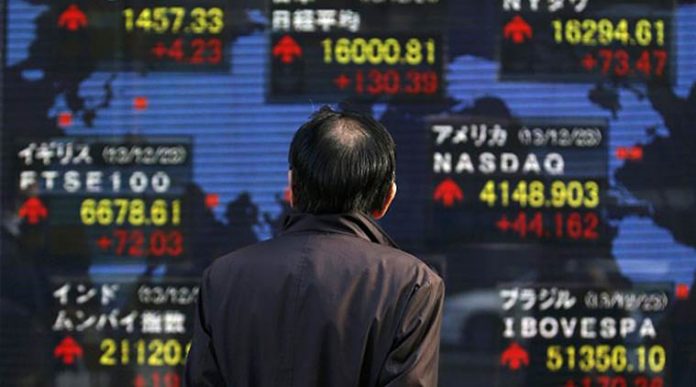TOKYO: Asian shares eked out modest gains on Thursday, clawing back sharp losses from earlier this week, however, rising U.S. bond yields and interest rates could dampen investors’ optimism toward the global economic outlook.
The U.S. Federal Reserve flagged interest policy tightening later this year and upgraded inflation outlook, at its policy meeting that ended on Wednesday, its first in 2018 and last to be chaired by Janet Yellen, who will be replaced by governor Jerome Powell on Feb 3. It kept interest rates on hold as expected.
MSCI’s broadest index of Asia-Pacific shares outside Japan rose 0.1 percent in early trade, slowly recovering after Tuesday’s 1.4 percent fall. Japan’s Nikkei also gained, rising 1.3 percent from a four-week low hit the previous day.
U.S. S&P 500 mini futures gained 0.4 percent in Asian trade on Thursday, helped by 1.4 percent gains in Facebook in after-hours trading following the company’s solid earnings.
Later in the day, three U.S. tech giants, Apple, Google parent Alphabet and Amazon.com will announce earnings.
Investors have been expecting strong profit growth in U.S. firms due to a sound global growth, with U.S. President Donald Trump’s tax cuts seen giving an additional boost to Corporate America’s bottom line.
Economic data released overnight underscored the strength of the global economy. ADP payrolls data in the United States showed job increases of 234,000 in January 49,000 more than economists’ forecast.
Caixin/Markit Manufacturing Purchasing Managers’ Index, a private business survey, came at 51.5, matching December’s reading, which was the highest in four months, showing growth in China’s manufacturing sector remained elevated in January.
For a growing number of investors, the biggest worry now is that the economy may accelerate too fast, lifting inflation and prompting central banks to tighten their monetary policy faster.
The yield on the 10-year U.S. Treasury note – the benchmark for world lending – briefly shot up to 2.754 percent, a level last seen in April 2014. It last stood at 2.725 percent.
Investors’ inflation expectations have also risen to 3 1/2-year high of 2.12 percent based on the so-called breakeven inflation (BEI) rate calculated by the gap between conventional bonds and inflation-protected bonds.
U.S. interest rate futures are now almost fully pricing in three rate hikes this year, compared to twice at the start of year, with some now talking about the possibility of four rate hikes.
On Wall Street on Wednesday, the S&P 500 erased earlier gains to end almost flat, up 0.05 percent at 2,823.81. The Dow Jones Industrial Average was up 0.28 percent, however, most of the benchmark’s gains were driven by a 4.9 percent rise in index heavyweight Boeing following its strong earnings. Stripping out Boeing’s rally, the index would have been down 0.18 percent.
Although rising U.S. yields lent some support for the dollar, the U.S. currency lacked momentum as investors are focusing more on a fresher theme of exit from stimulus in other economies, such as the euro zone.
The euro traded at $1.2420, consolidating after having hit a 3-year high of $1.2538 hit on Jan. 25, as investors bet the European Central Bank will be laying the groundwork for ending its asset purchase and raising interest rates.
The dollar changed hands at 109.33 yen, bouncing off a four-month low of 108.28 hit on Friday.
The British pound fetched $1.4200, after a 5.1 percent gain in January, its biggest since May 2009, owing to broad dollar weakness and expectations of a Brexit deal more favorable to the UK.
Oil prices rebounded after their slide earlier this week as strong demand for gasoline and distillate products and news that OPEC countries maintained heavy supply cuts in January offset the impact of rise in U.S. oil inventories.
U.S. crude futures gained 0.1 percent to $64.79 per barrel in early trade after gaining 7.7 percent in January, the best month for the contract since September.

























